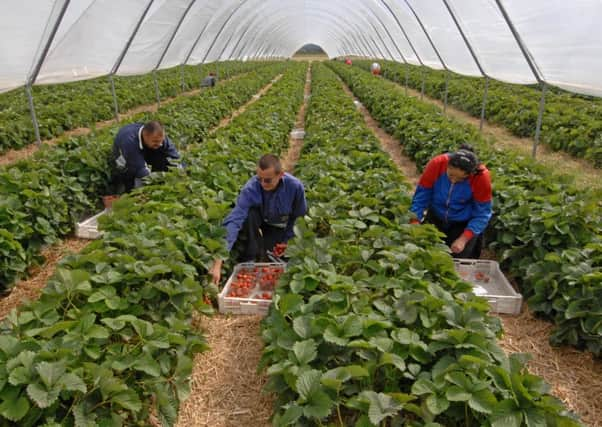YP Comment: Time to help our farmers


WITH British farming in a state of crisis, this is not the time for the Government to be placing more hurdles in the industry’s path.
Yet that is exactly what it has done by scrapping seasonal work permits. These allowed overseas workers to come to regions such as Yorkshire to help with harvests but were summarily stopped three years ago amid concerns over high numbers of economic migrants.
Advertisement
Hide AdAdvertisement
Hide AdThis is not a new problem: the industry has long had difficulties finding the tens of thousands of additional pairs of hands they require each year to get their crops out of the fields and on to supermarket shelves.
But the Government’s stance has made it even tougher with one in three farmers experiencing difficulties last year and many more left facing increased labour costs.
Farming Minister George Eustice previously told the National Farmers’ Union that local unemployed people should be recruited to do the work instead. It is not that simple. Growers have tried to recruit, and retain, British workers but without success.
The farms are not normally in high unemployment areas, British workers are reluctant to live on site and either cannot or will not work at the intensity required to earn the agricultural minimum wage.
Advertisement
Hide AdAdvertisement
Hide AdWhile this is an indictment of homegrown attitudes, there is a common sense solution – and it is the one put forward by the farmers themselves.
A new scheme open to agricultural students from all over the world allowing them to undertake seasonal harvest work would supply the necessary labour without adding to migrant numbers.
The alternative is higher food prices, increased imports and the loss of full time jobs that seasonal work support.
Now is the time for the Government to show that it is committed to helping British farmers, rather than hindering them.
Why we must take early years education more seriously
Advertisement
Hide AdAdvertisement
Hide AdSUCH is the pressure on today’s parents to both hold down full-time jobs – much of it attributable to the spiralling cost of owning a home – that there is a danger early years education comes to be regarded as little more than a glorified child-minding service.
Indeed, a survey has found that almost half of parents have worryingly low expectations for their child’s time in nursery. They hope, for instance, that their son or daughter will be able to grasp 100 words by their third birthday – yet this is only half of the recommended amount.
There is a clear need to challenge the misconception that learning can wait for school. This is not to say that children should be stuck in classrooms being drilled in English and maths from the age of three. The best learning is that which is instilled through fun and at such an early age it should revolve around play and the skilled channelling of a child’s natural curiosity.
However, it stands to reason that if the nation’s youngsters are to be better prepared for the start of their formal education then every nursery should certainly come equipped with a qualified early years teacher, as the Save The Children charity is now advocating.
Advertisement
Hide AdAdvertisement
Hide AdIn Yorkshire, where figures from the first set of formal testing of pupils at seven years old suggest more pupils are falling behind than anywhere else in the country, the need for such a focus is even more pressing.
Toddlers are incredibly open to learning at a stage in their development when their brains are like sponges, just waiting to soak up information. Yet we risk spurning the opportunity this presents for later achievement if we continue to take early years education less seriously than we should.
Sheffield on the right track
FROM Ernest Harper, silver medallist at the 1936 Olympics, through to middle-distance great Sebastian Coe and current Olympic and world heptathlon champion Jessica Ennis-Hill, Sheffield is synonymous with athletic excellence.
It is why the closure and subsequent demolition of the city’s Don Valley Stadium – where a 10-year-old Ennis-Hill was first introduced to the sport – was so painfully felt.
Advertisement
Hide AdAdvertisement
Hide AdSo it is heartening to see Sheffield reasserting its credentials as a place that looks to produce athletes of the future.
Its creation of one of the largest networks of running routes in the country is part of its bid to secure a reputation for outdoor pursuits.
There is no doubt that it will encourage more people to run and improve their fitness. Whether or not it will generate the track stars of tomorrow, time will tell.